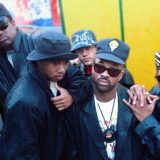
This article originally appeared in the November 1989 issue of SPIN. In light of Shock G’s death, we’re republishing it here.
“Say it loud, I’m arty and I’m proud,” because 1989 is the year of the boho homeboy. Back in the “who’s bigger and deffer” days, hip hop was fiercely competitive, more akin to sport than art; these days beyond def is the place to be. Unabashed experimental creativity—heavily influenced by George Clinton’s mid-70s costume funk revues—is making a big comeback. The Jungle Brothers, De La Soul, and Queens’ A Tribe Called Quest set the tone, but Oakland, California’s Digital Underground are now carrying the hip hop arthouse swing.
“Digital refers to the fact that we lean towards the techno end of hip hop,” says DU’s chief polemicist Shock G. “Underground refers to the ever-changing cast of characters that make up the band.” Like, to name a few, the cartoonish Humpty Hump, microphone wizard Money B, DJ Goldfingers (aka Fuse), R&B crooner Schmoovy-Schmoov, beat programmer and sampler extraordinaire Chopmaster J, and MC Blowfish (aka the Deep Sea Gangster), who, according to Digital Underground’s press release, is “wanted for impregnating a red sea bass at Marine World. Last seen rocking a house-fish party off the coast of San Diego.”
It could be a P-Funk comic opera, from the Pedro Bell-style cartoon album cover to the title and major theme of their extraordinary debut, Sex Packets. Forget crack, forget ecstasy, forget crank. Sex Packets are the drug of the future the way Digital Underground are the hip hop band of the future.
According to Shock G, Sex Packets were invented by Dr. Edward Cook at Stanford University as a way of relieving the sexual frustration of astronauts during long periods of space travel. The designer drug enables users to achieve orgasm without touching themselves. “The media suppressed news of this discovery, but the ‘packet theory’ has leaked out onto the streets,” says Shock G. “In the San Francisco area, Sex Packets are becoming more and more popular as an alternative to high-risk sex. The packets cost anything from $10 for a small dose to $50 for the orgy packet. They come in wrappers that look like condom packets and you swallow a capsule and fall into this trance-like wet dream. Our new album is the first true documentation available to the public about this new phenomenon. These songs are an actual account of what we saw, researched and—in my case—even tried.”
Digital Underground isn’t hip hop in any conventional sense; Shock G calls it “nonconformist hip hop.” “We’re trying to break out of the normal modes of music,” he says. “There’s no one out there like us. We’ve got diehard jazz musicians, diehard new school hip hop people, sophisticated R&B people, people who grew up on P-Funk, people who’re influenced by Kraftwerk techno-pop. We listen to EPMD, the Jungle Brothers, KRS-One and Thelonious Monk.”
On a scene dominated by teenagers, Digital Underground—whose members range in age from 15-27—know that b-boys can’t be boys forever. “Hip hop is growing up a little bit,” says Money B. “People don’t have to wear gold to be down anymore.”
“I like gold,” says Shock G. “But I can find something better to do with $10,000. There’s a lot of brothers coming up behind me who are gonna need help.”
And in a genre where geography is destiny and turf warfare—whether Bronx vs. Queens, East Coast vs. West Coast—is a way of life, Digital Underground break with precedent.
“We’re not a neighborhood hip hop band,” Shock G declares. “We’re an All-Atlantic, All-Pacific, All-City Hip Hop Dynasty. We’re based in Oakland at the moment, but members of the Underground come from all over the United States.
“People talk about West Coast rap like it was all the same thing. There’s a big difference between the Northern California scene and the Southern California scene. In LA they’re concerned with following New York. People in the North are more progressive and artsy. People in the Bay Area do it their own way or no way.”
Specifically mixed with extra bass boom for car systems, Sex Packets is a syncopated, subterranean cacophony that is both funky and freaky. It’s the people’s choice and an avant-garde wet dream.
“Digital Underground are heavily into noise,” says Shock G. “The beat track you hear on ‘Doowutchyalike’ and ‘Rhymin’ On The Funk’ is a slowed-down sample of the sound of a nuclear weapon coming out of a silo. That’s a patented Digital Underground sample truncation that uses a swivel latch assembly to the ninth power. But to really give it raw sound we use Acme No. 7 sandpaper. There’s a big hardware element to Digital Underground.”



Leave a comment